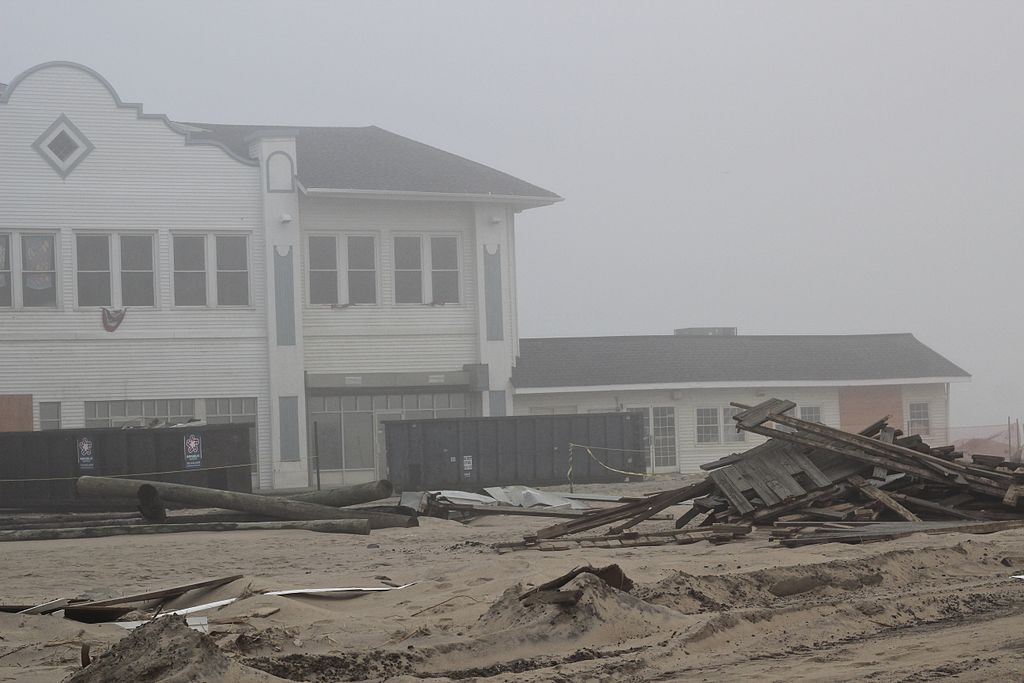Leaders of America’s design and construction industry – along with building owners and operators - for the first time have agreed to promote resilience in contemporary planning, building materials, design, construction and operational techniques as the solution to making the nation’s aging infrastructure more safe and secure.
CEOs of almost two-dozen leading design and construction industry associations with more than 700,000 members generating almost $1 trillion in GDP today used the occasion of “Building Safety Month” to issue a joint statement on resilience, which can be found here.
The statement was unveiled at a press conference at the National Building Museum, where a major exhibition titled Designing for Disaster presents design and building solutions for disaster mitigation, opened May 11.
“We recognize that natural and manmade hazards pose an increasing threat to the safety of the public and the vitality of our nation,” reads the statement, in part. “We further recognize that contemporary planning, building materials, design, construction and operational techniques can make our communities more resilient to these threats.”
The CEOs committed their design and construction sector organizations to significantly improve the resilience of the nation’s entire built environment through research into new materials, construction procedures and other methods to improve the standard of practice.
Among other things, they also committed the industry to educating itself through continuous learning; to advocating for effective land use policies; to responding to disasters alongside first responders; and to planning for future events, with a strategy for fast recovery.
“Resilient design places architects at the center of the solution, with particular emphasis on the private, non-governmental sectors," said American Institute of Architects CEO Robert Ivy, FAIA. “I would like to congratulate my fellow leaders in the design and construction sector for joining together to make sure resiliency is not viewed as just a fad but remains front and center in our efforts moving forward.”
In addition to the AIA, here is a list of organizations signing onto the joint statement on resilience:
American Council of Engineering Companies
American Planning Association
American Society of Civil Engineers
American Society of Interior Designers
American Society of Landscape Architects
American Society of Plumbing Engineers
ASHRAE
Associated Builders and Contractors
Associated General Contractors of America
Building Owners and Managers Association
International Code Council
International Interior Design Association
Lean Construction Institute
National Association of Home Builders
National Institute of Building Sciences International Facility Management Association
National Society of Professional Engineers
Royal Institute of Chartered Surveyors
Urban Land Institute
U.S. Green Building Council
About The American Institute of Architects
Founded in 1857, members of the American Institute of Architects consistently work to create more valuable, healthy, secure, and sustainable buildings, neighborhoods, and communities. Through nearly 300 state and local chapters, the AIA advocates for public policies that promote economic vitality and public wellbeing.
Members adhere to a code of ethics and conduct to ensure the highest professional standards. The AIA provides members with tools and resources to assist them in their careers and business as well as engaging civic and government leaders, and the public to find solutions to pressing issues facing our communities, institutions, nation and world. Visit www.aia.org.
Related Stories
| Aug 22, 2013
Energy-efficient glazing technology [AIA Course]
This course discuses the latest technological advances in glazing, which make possible ever more efficient enclosures with ever greater glazed area.
| Aug 21, 2013
Why research is the ticket to successful airport wayfinding
Wayfinding is more than just signs; it requires a holistic approach based on communicating information that helps people make the right decision at the right time.
| Aug 19, 2013
Discovery of hidden asbestos complicates DFW terminal renovations
The finding of more asbestos in Terminal B than expected, and the pending merger of US Airways and the airport’s largest tenant, American Airlines, is causing construction delays on a $2.3 billion Dallas/Fort Worth Airport terminal renovation.
| Aug 19, 2013
Integration of solar panels in building skin seen as key net-zero element
Recent high-profile projects, including stadiums in Brazil for the upcoming World Cup and Summer Olympics and a bank headquarters in the U.K., reflect an effort by designers to adopt building-integrated photovoltaics, or BIPV.
| Aug 14, 2013
Green Building Report [2013 Giants 300 Report]
Building Design+Construction's rankings of the nation's largest green design and construction firms.
| Jul 29, 2013
2013 Giants 300 Report
The editors of Building Design+Construction magazine present the findings of the annual Giants 300 Report, which ranks the leading firms in the AEC industry.
| Jul 22, 2013
Transportation Facility Report [2013 Giants 300 Report]
Building Design+Construction's rankings of design and construction firms with the most revenue from airport terminals and other transportation-related facilities, as reported in the 2013 Giants 300 Report.
| Jul 19, 2013
Renovation, adaptive reuse stay strong, providing fertile ground for growth [2013 Giants 300 Report]
Increasingly, owners recognize that existing buildings represent a considerable resource in embodied energy, which can often be leveraged for lower front-end costs and a faster turnaround than new construction.
| Jul 18, 2013
Top Local Government Sector Construction Firms [2013 Giants 300 Report]
Turner, Clark Group, PCL top Building Design+Construction's 2013 ranking of the largest local government sector contractor and construction management firms in the U.S.
| Jul 18, 2013
Top Local Government Sector Engineering Firms [2013 Giants 300 Report]
STV, URS, AECOM top Building Design+Construction's 2013 ranking of the largest local government sector engineering and engineering/architecture firms in the U.S.














